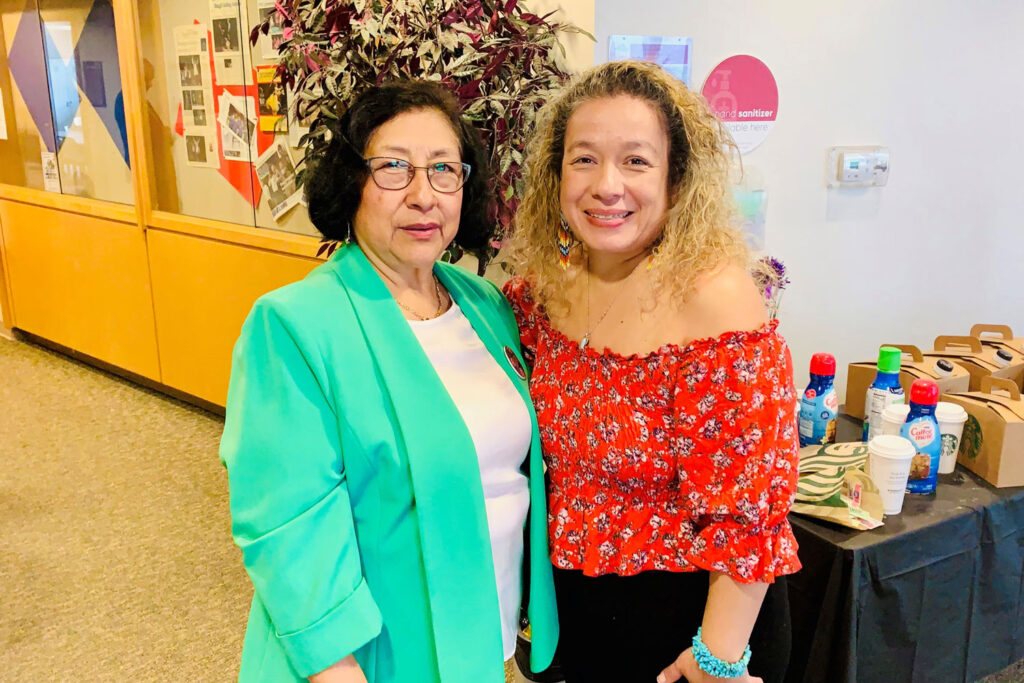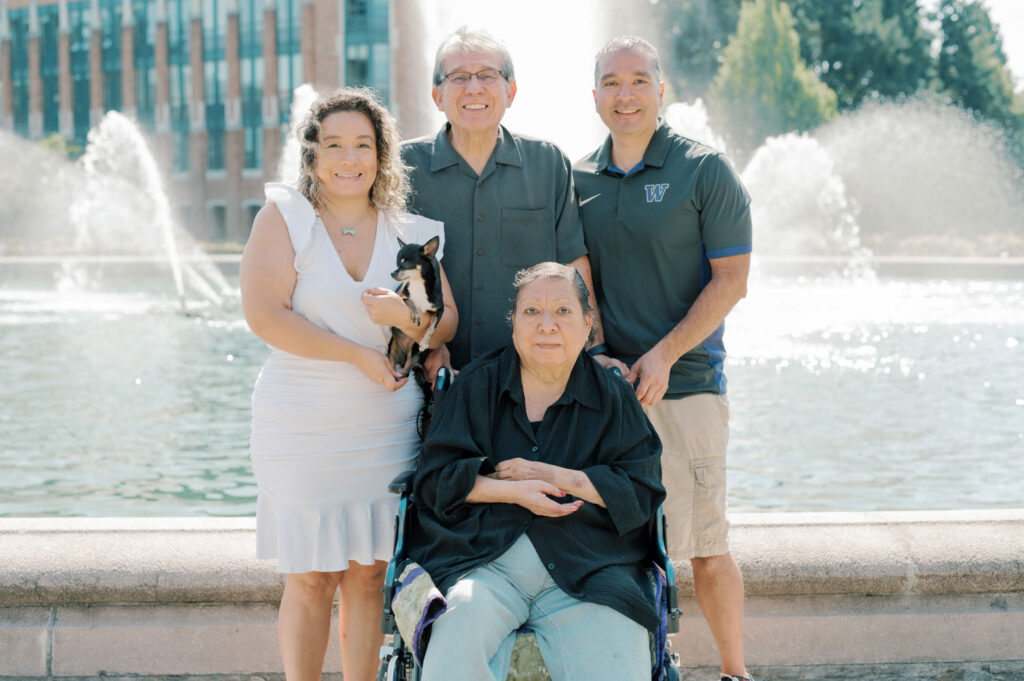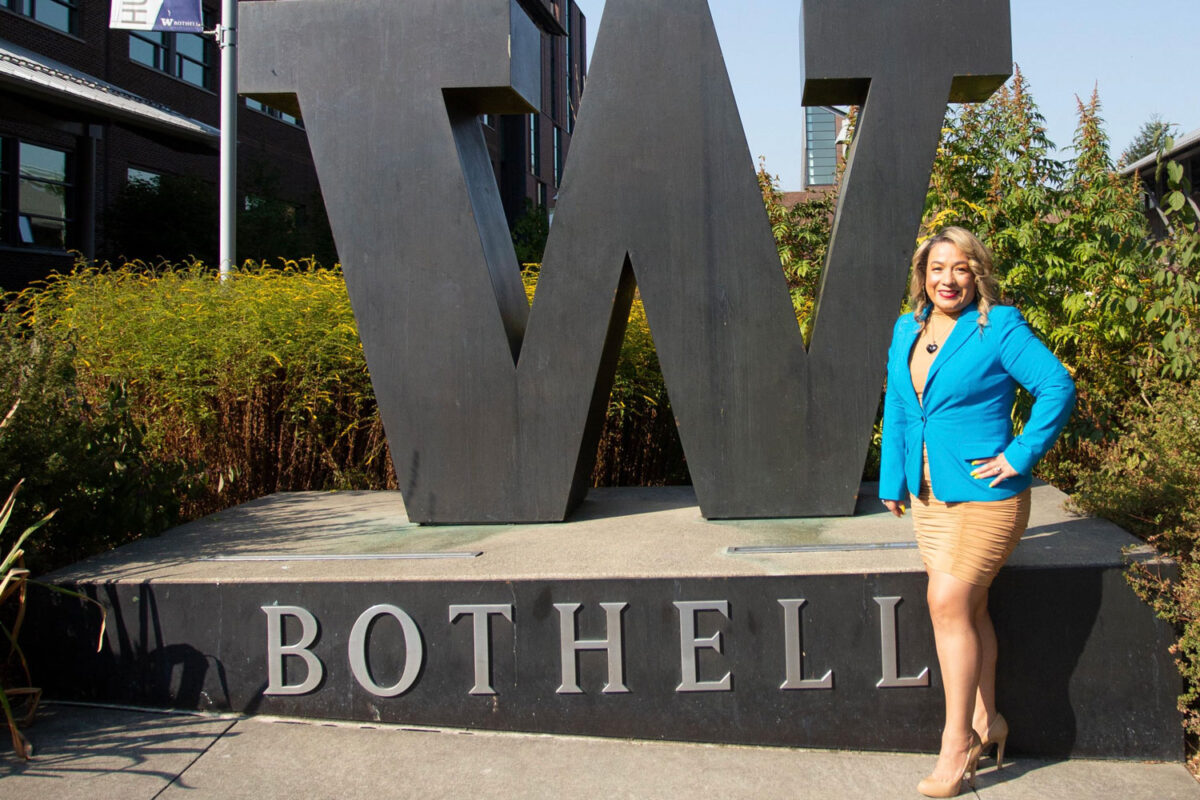Growing up the daughter of a migrant farmworker, Felicity Abeyta developed a fascination with her mother’s bag.
This wasn’t a purse or a tote. It was the long cotton sack that Abeyta’s mother had used as a girl, picking cotton under the Arizona sun. In order to earn enough money to support her family’s survival, she had to fill the sack with her quota of cotton every day. If she and her siblings didn’t pick enough, there might not be enough money for food or bills.
Abeyta listened closely to her mom’s stories of long, brutally hot days laboring in fields full of prickly cotton plants. She decided early on that she would honor those hardships by shouldering a different kind of bag: a college student’s backpack.
“Hearing those stories gave me the determination that ‘I’m going to have the backpack to show the legacy my mom has,’” said Abeyta. “That’s been my vision since I was a student at the University of Washington Bothell.”
Now a pre-major academic adviser at her alma mater, the 2003 alumna (Society, Ethics & Human Behavior) is driven to serve her Latinx community, which faces a societal lack of awareness and entrenched cultural biases. In recognition of her advocacy for the Latino Leadership Initiative — a multicultural program that supports UW Bothell and other area students — Abeyta has received UW Bothell’s 2024 Outstanding Public Service Award.
“It’s been an honor, an absolute humbling honor,” said Abeyta of her recognition. “To have an award like this has been a huge uplift for me. It generates more energy to be able to help others. It’s like a ‘Thank you, Mama.’”
Propelling the next generation of Latino leaders
Abeyta has focused her energies on the Latino Leadership Initiative, which UW Bothell joined in 2019. Founded by the Latino Education & Training Institute, the program helps students at UW Bothell, Edmonds College, Skagit Valley College and Bothell High School to develop leadership skills, grow community networks, engage in civic activities and pursue their dreams.
Former LLI supervisor and UW Bothell lecturer Dr. Victoria Breckwich Vasquez — with Abeyta at her side — set out to fill a resource gap in the Latinx community. “So much of their experience, mine included, is constantly struggling to put their best foot forward,” said Dr. Vasquez, “and to find resources that they can use for their own professional development.”
In the two-quarter program, a cohort of 50-60 LLI students meets regularly with Latinx-identified trailblazers of all kinds: musicians, artists, community activists, politicians, teachers and health care leaders. For most students, LLI provides their first encounter with people in these positions who share their culture.
“A lot of it has to do with storytelling,” said Abeyta. “How did this person overcome barriers to achieve success?”
UW Bothell students discover their own answers as they become mentors to Latinx students at Bothell High School. They offer much-needed help with college and scholarship applications — or simply lend an ear to struggling teens. Many LLI high school students hail from immigrant families who simply aren’t equipped to advise them on their journey to college.
Going to bat for LLI’s people and programs
Last year, LLI member Adriana Hernandez Hernandez, a senior majoring in Mathematics and minoring in Computer Science & Software Engineering, was matched with Francis Espinoza, then a high school senior and recent immigrant.

In the midst of navigating a new culture and a new language, Espinoza landed a STEM scholarship. But she still wasn’t convinced that UW Bothell was right for her. In the end, it was Abeyta’s high-touch support that made the difference. “I was texting her all the time,” said Espinoza. “She even answered my messages on the weekend.”
The Nicaragua native eventually chose to enroll in UW Bothell as a first-generation student in pursuit of a computer science degree. This fall, she’ll return to the LLI and begin serving as mentor herself.
In autumn 2023, when the initiative’s future on campus looked tenuous, Abeyta swung into action, coordinating meetings between LETI, the Office of Connected Learning, the Latinx Student Union and other key players. Abeyta is quick to credit her colleagues in OCL for LLI’s survival, but her dogged support made all the difference.
“Felicity’s passion for our community really shone through when she fought to keep this program alive at UW Bothell,” said LETI founder and CEO Rosario Reyes. “She went above and beyond to ensure the University’s commitment to the LLI partnership.”
“Felicity’s passion for our community really shone through when she went above and beyond to ensure the University’s commitment to the LLI partnership.”
Rosario Reyes, LETI founder and CEO
Harnessing the power of story
Abeyta has traveled far from her own undergraduate days, when she was a single mom in an abusive domestic situation. “I remember crying by myself in the bathroom,” she said. “I was so scared to go somebody.”
After confessing her situation to a professor, she eventually found help. And she worked hard to educate herself about domestic violence and to leave the abusive situation.
It was in a UW Bothell mask-making workshop inspired by Indigenous mourning traditions that Abeyta also discovered the power of storytelling to transform and heal. She and the other students decorated masks and used them to tell their stories. “I was able to express what I was going through at the time,” said Abeyta. “I felt very empowered.”
Her undergraduate experience will now inform the new curriculum she’s writing with Cinthya Vieyra, a UW Bothell academic success coach. The two have been accepted to the 2024-25 Faculty & Staff Fellows Program through the Office of Diversity, Equity & Inclusion, and will create a program called “Who You Are Makes a Difference.” Storytelling will play a central role, Abeyta said, as Latinx and other BIPOC and first-generation students look at their pasts and their families to build their identities today.
“My life’s mission has always revolved around serving communities in need — a value instilled in me by my mother, whose life was cut short by health inequities,” said Abeyta. “Her legacy fuels my commitment to paving the way for others.”





